Minister for Industry and DG NCSP outline Key Priorities for Industrial Transformation
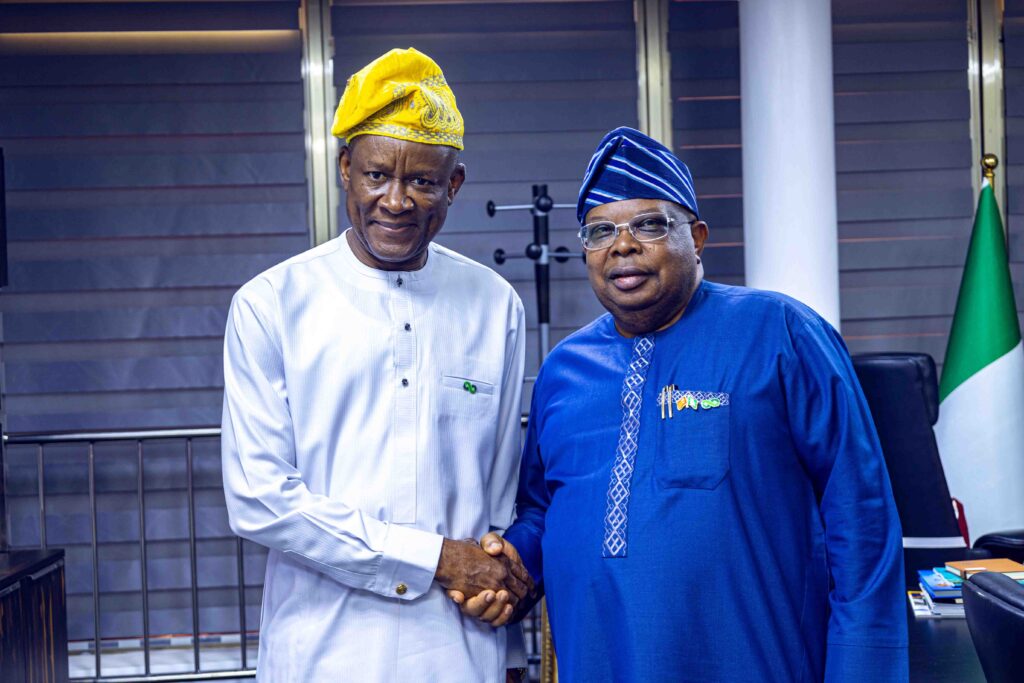
In a bold push to accelerate Nigeria’s industrial transformation under President Bola Ahmed Tinubu’s Renewed Hope Agenda, the Director-General of the Nigeria-China Strategic Partnership (NCSP), Mr. Joseph Tegbe, met with the Honourable Minister of State for Industry, Trade, and Investment, Sen John Owan Enoh to outline strategic priorities that will drive economic self-reliance and inclusive growth. While receiving the DG, the Honourable Minister outlined the Federal Government’s focus on revitalizing three critical sectors: Sugar, Cotton-Textile-Garment (CTG), and Automobiles. These sectors—each supported by dedicated industry councils—form the backbone of a broader strategy to boost local production, stimulate domestic demand, and enhance global competitiveness. Central to this strategy is the Nigerian First Policy, a directive by President Tinubu that mandates all Ministries, Departments, and Agencies to prioritize Nigerian-made goods and services in public procurement. This policy is already reshaping procurement practices, generating jobs, and reducing reliance on imports. Reinforcing this agenda, DG NCSP Joseph Tegbe affirmed Nigeria’s commitment to transitioning from a consumption-based economy to a production and export-driven industrial power, positioning itself as a development partner to China rather than a mere trading counterpart. Drawing on Brazil’s export success—reaching $94.41 billion in trade with China in 2024—he emphasized Nigeria’s readiness to replicate such growth across sectors including agriculture, mining, and manufacturing. To fast-track implementation, the Honourable Minister spotlighted the launch of the Industrial Revolution Working Groups (IRWG), a key component of the Presidential Council on Industrial Revitalization Roadmap. These working groups, comprising government and development partners, are driving reforms across infrastructure, access to finance, and technological innovation to revive dormant industries and expand production. On the investment front, the NCSP is mobilizing leading Chinese firms to set up production facilities in Nigeria. Landmark agreements have been secured with Huawei, China Communications Construction Company (CCCC), Chilwee Group, Choice International Group (CIG) and others across manufacturing, automotive, communication technology, and renewable energy. These partnerships are expected to generate thousands of jobs and accelerate Nigeria’s transition to value-added production. As Nigeria moves steadily toward industrial self-sufficiency, the Nigeria-China Strategic Partnership remains a vital pillar of the Renewed Hope Agenda, leveraging China’s Belt and Road Initiative to unlock transformative investments that will power long-term, sustainable national development.
FG Reconvenes Inter-Ministerial Meeting to Accelerate Implementation of Nigeria-China Focac Agreements
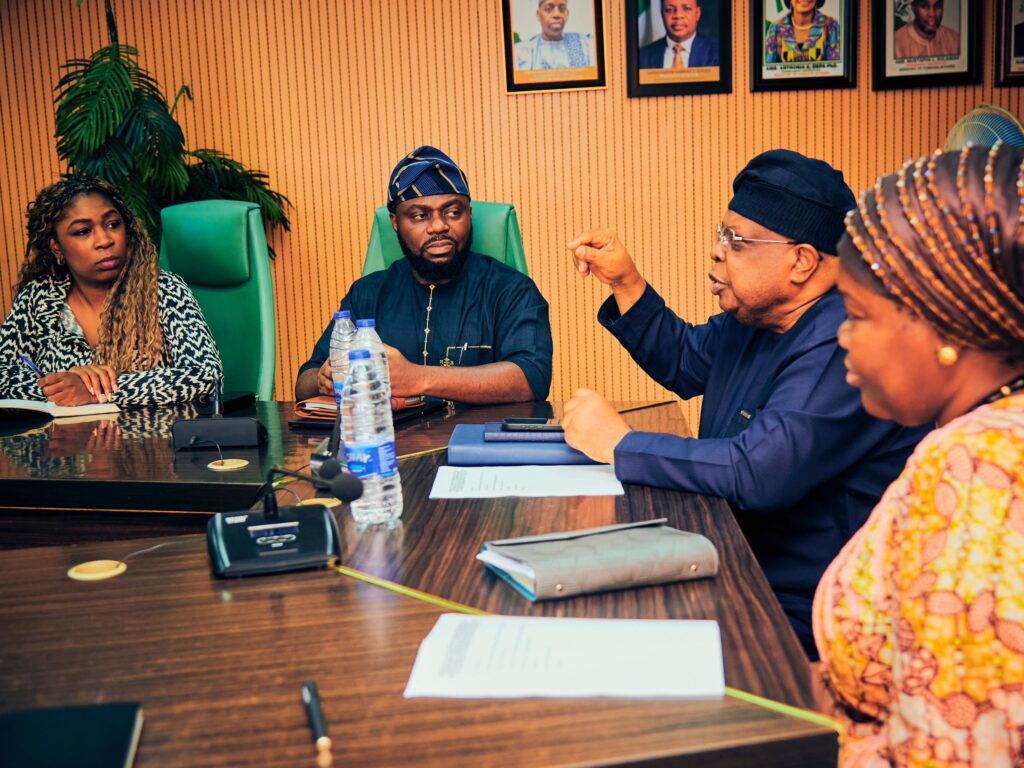
In a renewed effort to fast-track the implementation of strategic agreements with the People’s Republic of China, the Federal Government of Nigeria has reconvened a high-level inter-ministerial follow-up meeting. The session, jointly organized by the Ministry of Foreign Affairs and the Nigeria-China Strategic Partnership (NCSP), focused on reviewing progress and resolving challenges related to outcomes from the 2024 FOCAC Summit and President Bola Ahmed Tinubu’s historic state visit to China. The meeting, chaired by Ambassador Janet Olisa, Director of Regions at the Ministry of Foreign Affairs, brought together key representatives from Ministries, Departments, and Agencies (MDAs) involved in the bilateral cooperation. MDAs provided situation reports and outlined steps to strengthen collaboration for the successful implementation of signed agreements. Ambassador Olisa reaffirmed Nigeria’s commitment to leveraging its strategic partnership with China for inclusive economic development. She emphasized the urgency of converting memoranda of understanding (MOUs) into actionable projects that deliver tangible benefits to Nigerians. Discussions focused on resolving legal and institutional bottlenecks, aligning implementation strategies, and clarifying access modalities to Nigeria’s targeted share of China’s $51 billion pledge for green infrastructure development across Africa. Nigeria aims to secure at least $10 billion in funding for priority sectors including agriculture, digital economy, and critical infrastructure. Director-General of NCSP, Mr. Joseph Tegbe, reiterated the agency’s role in coordinating implementation efforts and called on MDAs to be proactive. “This partnership offers Nigeria a unique opportunity to unlock investments that will drive job creation, economic diversification, and long-term prosperity,” he stated. Resolutions from the meeting included harmonization of legal frameworks, alignment of project roadmaps, budget optimization, and the establishment of technical committees to accelerate implementation. A follow-up review session has been scheduled in the coming weeks to track progress on agreed action items, while the various MDAs continue their working meeting to resolve challenges. The Nigeria-China Strategic Partnership remains a cornerstone of the Renewed Hope Agenda, complementing China’s Belt and Road Initiative to catalyze transformative development in Nigeria.
Director-General Joseph Tegbe recently hosted Ms. Aisha Rimi, the Executive Secretary and Chief Executive Officer of the Nigerian Investment Promotion Commission (NIPC).
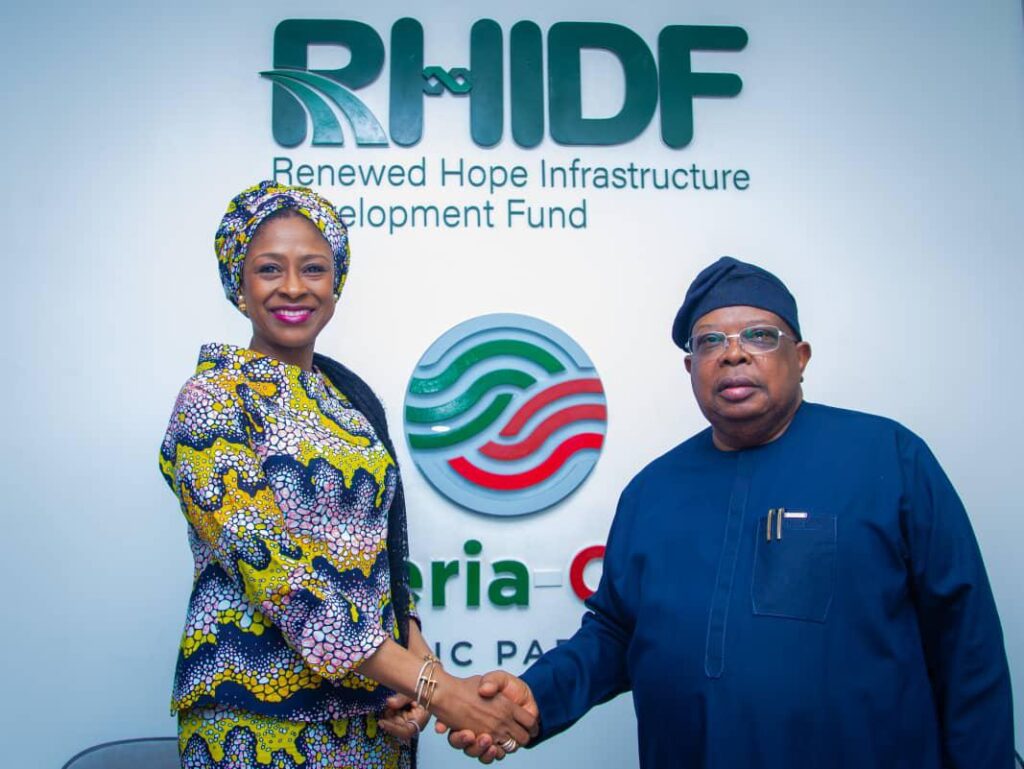
As part of efforts to bolster foreign investment under the Nigeria-China Strategic Partnership (NCSP), Director-General Joseph Tegbe recently hosted Ms. Aisha Rimi, the Executive Secretary and Chief Executive Officer of the Nigerian Investment Promotion Commission (NIPC). This meeting underscored the ongoing collaboration between the NCSP and the NIPC, particularly in facilitating the seamless entry and establishment of Chinese businesses in Nigeria. Over recent months, both entities have worked together to create a more investor-friendly environment for Chinese enterprises. The partnership seeks to deepen economic ties between Nigeria and China, leveraging Chinese investment to support Nigeria’s economic diversification efforts—especially in key sectors. This initiative aligns with the Renewed Hope agenda of President Bola Ahmed Tinubu, which prioritizes economic growth, job creation, and inclusive national development. By attracting more foreign direct investment (FDI) through this strategic collaboration, NCSP and NIPC aim to stimulate industrial growth, enhance technology transfer, and create opportunities that will ultimately improve the livelihoods of ordinary Nigerians.
PRESIDENT TINUBU RECEIVES NCSP DG, URGES ACCELERATION OF STRATEGIC PROJECTS
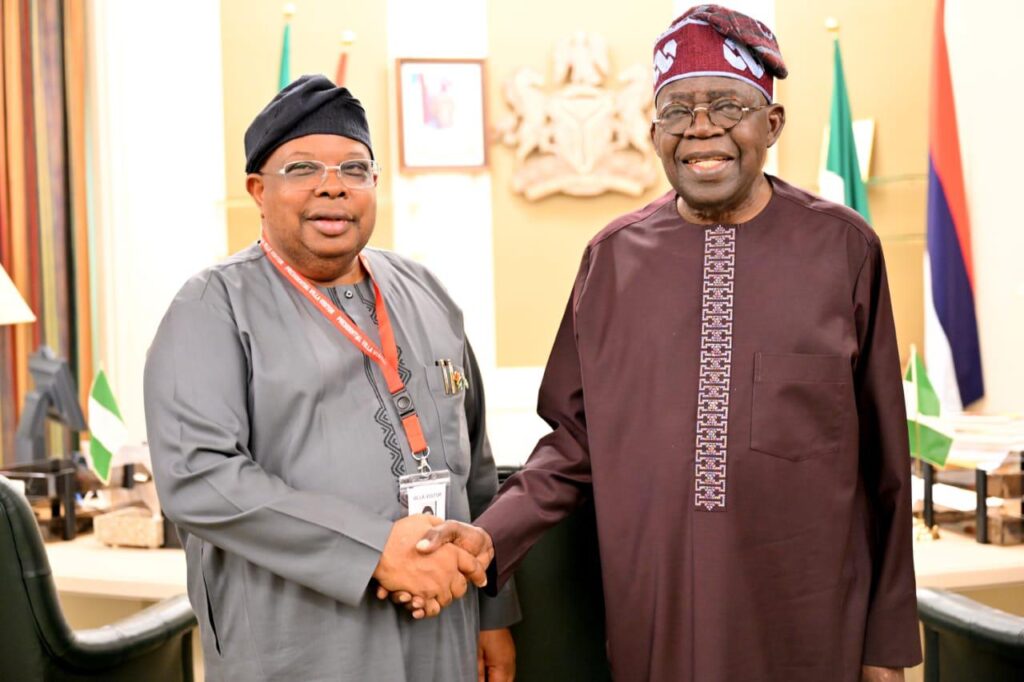
DG NCSP presents compendium of activities to the Chinese Ambassador to Nigeria
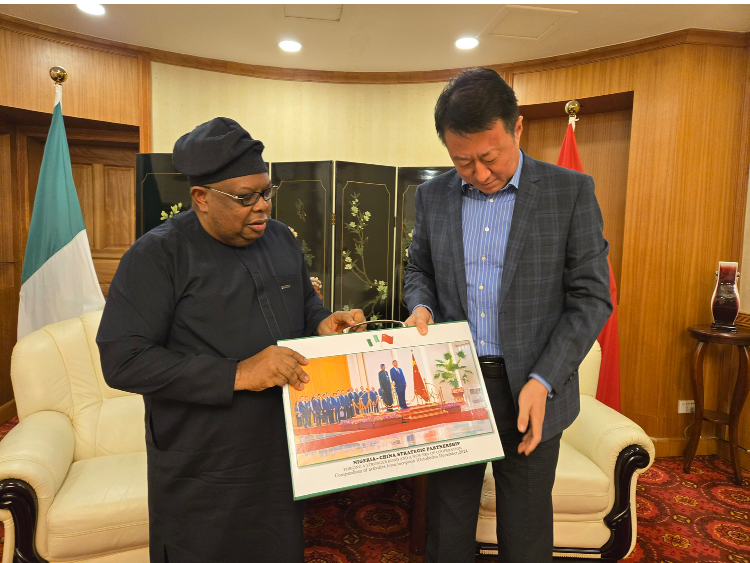
The Director-General of the Nigeria-China Strategic Partnership (NCSP), Mr. Joseph Olasunkanmi Tegbe, recently paid a consultative visit to the Embassy of the People’s Republic of China in Nigeria. During the visit, the DG presented a compendium of NCSP activities to His Excellency Yu Dunhai, Chinese Ambassador to Nigeria. The report detailed the activities and achievements of the NCSP, highlighting its commitment to strengthening bilateral relations and fostering strategic collaboration between Nigeria and China in key sectors of mutual interest. This presentation reaffirms the NCSP’s dedication to information sharing, deepening economic cooperation, infrastructure growth, and technological innovation between the two nations, as emphasized in the recently established Comprehensive Strategic Partnership.
We have taken our relationship with China very seriously”–Tegbe
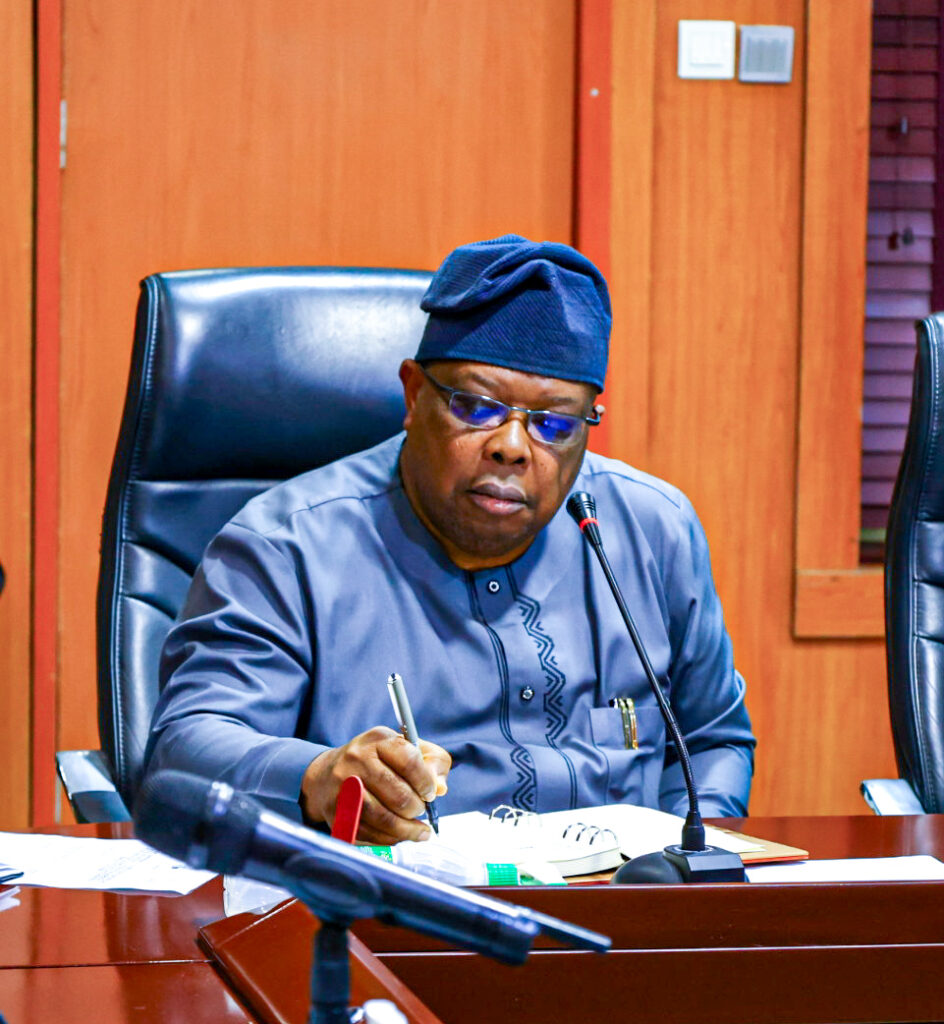
In this Exclusive Interview with Joseph Tegbe, Director-General and Global Liaison for the Nigeria-China Strategic Partnership, Tegbe who was in China on a working visit, speaks extensively on the purpose of his office, his view of China, visit of Chinese FM to Nigeria, FOCAC, plans, vision and sundry issues. Q: welcome to China, how many times have you been to China? A: Thank you very much. This is my 13th time in China. The first time that I was in China was in 2002, then I came back in 2006, I was here for Beijing Olympics with my family in 2008 and subsequently, I have been here a couple of times. It is great to be back in China. Q: I remember you told me that everytime that you come to China, you could see that China is changing. You said China is changing very fast. So, what kind of change do you mean? A: Everytime I come to China, everything is improved, especially in infrastructure. I see a lot of infrastructural development in China and again, beyond that, I see that China has over the last twenty years become self-sufficient and I always marvel at the discipline of the Chinese. Overtime, the integration of China with the rest of the world is improving and China is becoming a metropolitan country. Q: Many of my Chinese and Nigerian friends have asked me about the nature, type and organization of the Nigeria-China strategic office. Whether it is governmental or nongovernmental. Can you give us more information? A: Let me give you an introduction to the Nigeria-China strategic office. It is a government office setup in the Presidency of the Federal Republic of Nigeria. I have my background in the private sector. Before, I spent thirty-five years working with Arthur Andersen, a renowned American firm in consultancy. I also worked with KPMG and I retired from KPMG last year after thirty-five years of working in KPMG. Before my career in consulting, I had a stint in Engineering. I graduated with a first class in Civil Engineering, mastering in structures and then I specialized in human resources strategy, technology and public sector advisory. Now, the Nigeria-China strategic partnership office was set up in September, 2024. It is just about 3 months to 4 months old. At the September 2024 FOCAC here in Beijing, President Xi Jinping and President Bola Ahmed Tinubu agreed to elevate the relationship between China and Nigeria to a Comprehensive Strategic Partnership. On the basis of that, we have taken our relationship with China very seriously. We elevated our relationship with China and President Bola Ahmed Tinubu decided to appoint me as the Director-General and Global Liaison for Nigeria and China Strategic Partnership. What are my roles? Number one is to coordinate, monitor and evaluate all the agreed projects between Nigeria and China agreed at FOCAC. There were 54 programmes and projects that were agreed in the MOUs that were signed between the two countries. Those projects span from infrastructure to agriculture to health care to education to mining, manufacturing and technology. Now, in the past few years, when those things are agreed, you don’t have a central point for coordination. So, my role is to coordinate and ensure that those projects and programmes are adequately implemented. But beyond that, my secondary role is to ensure that all relationship between Nigeria and China from the perspective of business and economy are properly evaluated and properly monitored and ensure there is value for money and a win-win relationship between China and Nigeria. That is what my role is. But underlying that, you cannot do business, you cannot do economic development without some level of diplomacy. So, I work with the Ministry of Foreign Affairs and other Ministries in Nigeria and the Ambassador, the Chinese Ambassador to Nigeria and now Ambassador in Beijing here, the Charge d’ Affaires, to ensure there is coordination. So that is what my role is. Q: In recent years, China and Nigeria have jointly implemented a large number of strategic cooperation projects under FOCAC that you have just mentioned. Could you tell us about these achievements and cooperation between China and Nigeria in recent years? A: The relationship between China and Nigeria dated back to over fifty years ago. And the relationship between Nigeria and China has always been very cordial. China has always respected Nigeria and Nigeria significantly respects China. FOCAC projects that are agreed span across those seven sectors I mentioned earlier. But most importantly, in the last couple of years, there has been a lot of infrastructure development in Nigeria, championed and facilitated by China. China has been assisting Nigeria with funding and with technology and expertise in the area of infrastructure. Most of the major infrastructure development in Nigeria today, are carried out by Chinese companies. And they do not only do the building and development, they maintain. Many companies like China Communications Construction Company have played major roles in Nigeria, developing our roads, developing our ports. And then in the railway sector, China has played a significant role and they continue to play roles that in the next few years, you are going to see China moving from infrastructure and getting involved in things like agriculture, technology and education. And beyond that, I will tell you, China has played a significant role in our telecommunication sector. Companies like Huawei were early comers in Nigeria. So, today, some of the FOCAC projects have played a significant role in developing Nigeria and it has been a very mutual relationship. Q: Early this month, we are aware that a member of the Political Bureau of the Central Committee and Foreign Minister, Mr. Wang Yi, His Excellency, paid a very successful visit to Nigeria. What are your comments concerning Mr. Wang’s bilateral talks with President Tinubu and Minister Tuggar. What is the impact of this visit on China-Nigeria relations? A: Thank you very much. Mr. Wang Li who is a very respected Chinese Minister and
COMPREHENSIVE STRATEGIC PARTNERSHIP: A NEW ERA IN NIGERIA-CHINA RELATIONS (News Analysis)

“There is no better mirror than a best friend,” says an African proverb. From all indications, the axiom appears quite apt while assessing the current state of Nigeria-China relations, which have spanned over five decades. This is because the bilateral relations existing between Nigeria and People’s Republic of China, which began after the establishment of diplomatic relations between the two nations in February 1971, have significantly flourished to a level that culminated in the attainment of a Strategic Partnership in 2005; lately upgraded into a “Comprehensive Strategic Partnership”. It is pertinent to note that in September 2023 — on the sidelines of the Forum on China-Africa Cooperation (FOCAC) summit in Beijing – Nigeria’s President Bola Ahmed Tinubu and his Chinese counterpart, President Xi Jinping, signed the joint statement on the ratification of the partnership upgrade. The Chinese Ambassador to Nigeria, Yu Dunhai, who also witnessed the event in Beijing, said that the upgrade of the Nigeria-China relations to the “Comprehensive” level represented a boost to the decades-long bilateral relations between the two countries, which have entered a “New Era”. It will be recalled that at the FOCAC summit in Beijing, President Tinubu and President Xi issued a joint statement, on behalf of the Federal Republic of Nigeria and People’s Republic of China, regarding the building a high-level China-Nigeria community with a shared future. The joint statement particularly covered and focused on four aspects — high-level strategic mutual trust, high-level development cooperation, high-level mutual assistance and high-level mutual understanding – which underscored the essence of establishing a comprehensive strategic partnership, while mapping out the blueprint for the future development of Nigeria-China relations in the new era. The validation of the new era strategic partnership between the two sides entailed the adoption of 13 cooperation documents, covering areas such as high-quality Belt and Road Initiative cooperation and planning, the implementation of the Global Development Initiative, economic growth, human resources, application of the Beiduo Satellite Navigation System, export of peanuts to China and media exchanges. In addition to the 13 cooperation documents, one particular aspect of the partnership entails about 19 projects, which Nigeria and China are jointly executing.Shortly after his return from the FOCAC summit in Beijing, President Tinubu adopted a proactive approach to ensure that the cooperation agreements, which were signed, were duly implemented. Accordingly, President Tinubu approved the establishment of the Nigeria-China Strategic Partnership (NCSP) and appointed Mr. Joseph Tegbe, as its Global Liaison and Director-General, with a mandate of overseeing the implementation of the signed agreements through engagement with the Chinese counterparts, while ensuring the alignment of all deliverables with national development goals. In addition, in the strategic plan, the NCSP is expected to outline specific deliverables, timeliness and key performance indicators for each area of cooperation, including priority projects, projected investments and expected socio-economic outcomes. Tegbe, the Director-General of NCSP, who spoke on his assignment in a recent interview with a Chinese media outfit in Beijing, emphasized that there were 54 programmes and projects that were approved in the MOUs which were signed between the two countries. He added that these encompassed projects in infrastructure, agriculture, health care, education, mining, manufacturing and technology sectors, among others. He underscored the wisdom in creating the NCSP office to coordinate and ensure the proper implementation of the projects and programmes, recalling that in the past when such partnerships were created, the perceptible lacuna was the absence of a central point for their coordination. Tegbe, reiterated that his central role was to ensure the coordination of all NCSP projects and programmes, while overseeing their hitch-free implementation. He emphasized that his secondary role as the D-G of NCSP was to ensure that the business and economic relations between Nigeria and China were properly evaluated and monitored, so as to ensure value for money and promote a win-win relationship between the two countries. As the Nigeria-China relations continue to grow and flourish over the years, observers note that landmark achievements have been recorded in the execution of several projects, which are either ongoing or completed. They point at the Lagos-Ibadan standard gauge rail line, Abuja-Kaduna standard gauge rail line, rehabilitation of six airport terminals rehabilitation, Lekki Deep Seaport, Abuja-Keffi-Makurdi expressway, Abuja rail mass transit and Lagos rail mass transit as accomplishments. Other feats are recorded in infrastructure development, agro-industry, education, technology transfer, healthcare and telecommunication, among other development projects, they add. All in all, analysts have expressed optimism that the mutual bond between Nigeria and China will continue to flourish via the pragmatic adoption of mutually beneficial practices that are based on inclusiveness, equal opportunities, people-to-people engagements and mutual respect for one another; all in the face of the diversity of cultures and political systems. Obviously, there exists a new epoch in Nigeria-China relations that would be mutually beneficial to the two nations, under the aegis of Comprehensive Strategic Partnership. — Sale is an Abuja-based Global Affairs Analyst (lawalmaida1@yahoo.com)
Happy Chinese New Year 2025
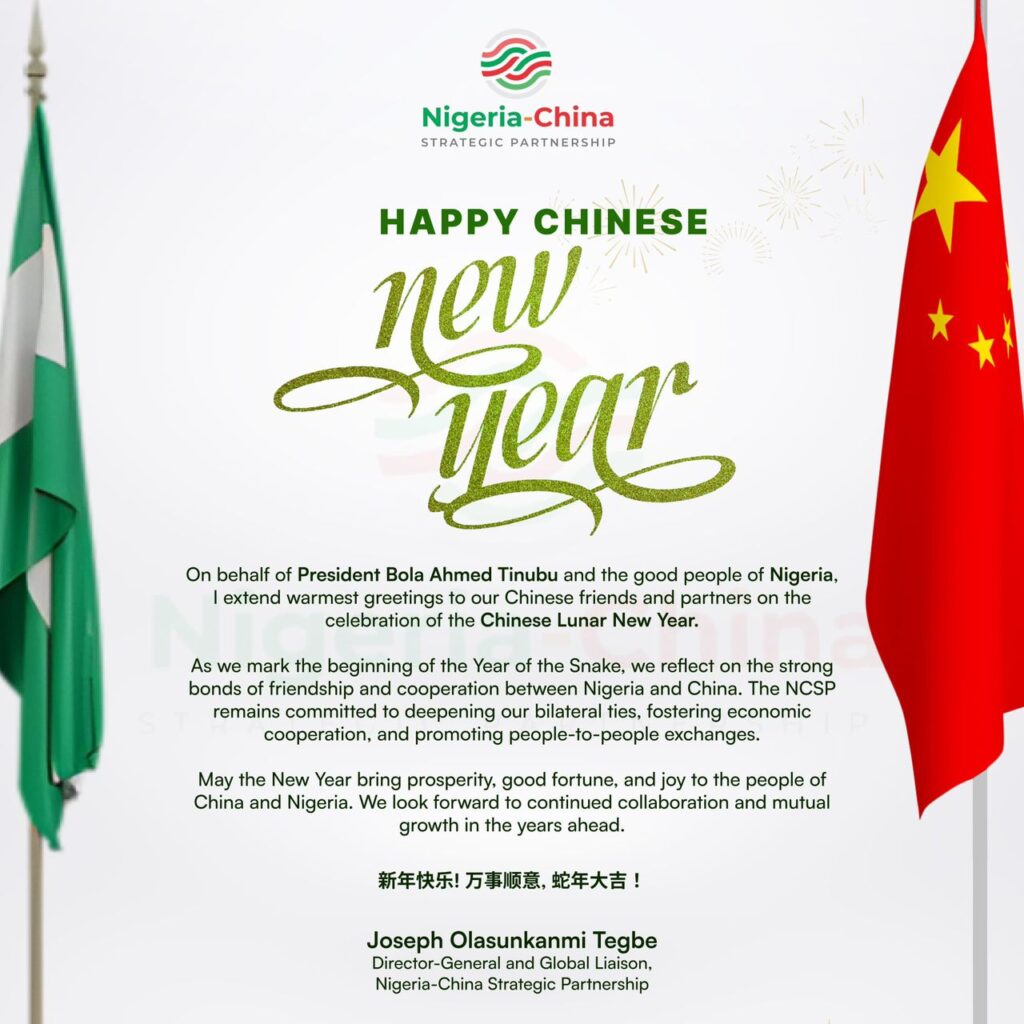
On behalf of President Bola Ahmed Tinubu and the good people of Nigeria, I extend warmest greetings to our Chinese friends and partners on the celebration of the Chinese Lunar New Year. As we mark the beginning of the Year of the Snake, we reflect on the strong bonds of friendship and cooperation between Nigeria and China. The NCSP remains committed to deepening our bilateral ties, fostering economic cooperation, and promoting people-to-people exchanges. May the New Year bring prosperity, good fortune, and joy to the people of China and Nigeria. We look forward to continued collaboration and mutual growth in the years ahead. 新年快乐! 万事顺意, 蛇年大吉! Joseph Olasunkanmi TegbeDirector-General and Global Liaison,Nigeria-China Strategic Partnership
President Bola Tinubu recieves H.E Foreign Minister Wang YI in the State House
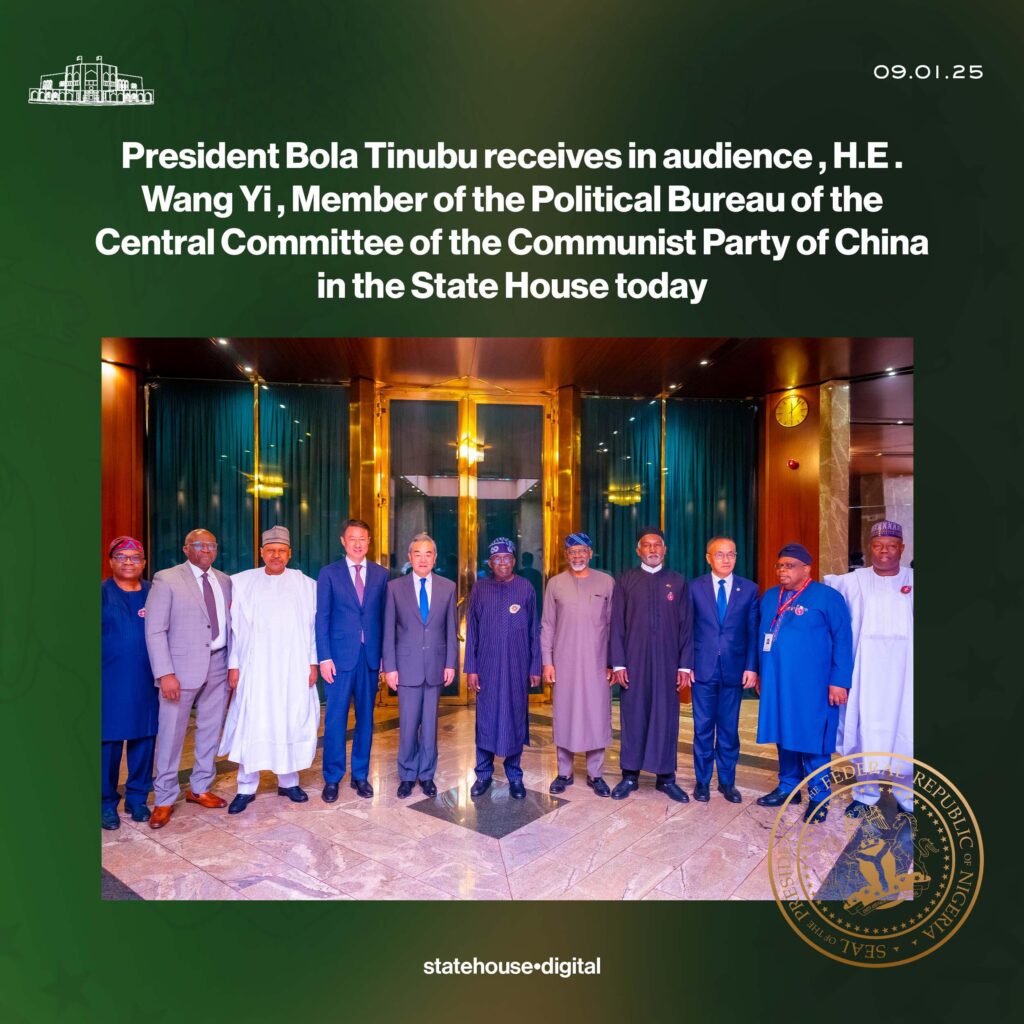
Nigeria has reaffirmed its commitment to agreements with China, strengthening bilateral ties between the two nations. This was stated as President Bola Ahmed Tinubu hosted the Chinese Minister of Foreign Affairs, Wang Yi in the State House, Abuja. President Tinubu, who was joined by Senior Government Officials including the Minister for Foreign Affairs Ambassador Yusuf Tuggar and the Director-General of the Nigeria-China Strategic Partnership, emphasized that the relationship between both countries was elevated to a comprehensive strategic partnership with the aim of building a high-level China-Nigeria community with a shared future and mutual prosperity. The Director-General of the Nigeria-China Strategic Partnership emphasized that “Nigeria’s partnership with China is a strategic one, aimed at driving economic growth and development. According to the Czar, one of Nigeria’s primary goals is to increase trade volume between Nigeria and China and address the trade imbalance. The Director-General pointed out that China has been a reliable partner and Nigeria looks forward to deepening cooperation in areas such as trade, investment, and infrastructure development.He added that under the partnership, China would transition from being a mere trade partner to a development partner in the industrialization of Nigeria. According to him, “It is worth noting that industrializing Nigeria means industrializing 25% of Africa. An economically sound and stable Nigeria signifies a prosperous continent of Africa.” Chinese Foreign Minister Wang Yi praised Nigeria’s role as a major African power with global influence and its contributions to the global South. “Nigeria is a major African country with global influence. It is an important member of the global South. As we work for Africa’s peace and development, Nigeria plays an irreplaceable and important role,” he noted. Wang emphasized China’s tradition of prioritizing Africa in its foreign policy, expressing hope that continued collaboration will bring tangible benefits to both nations. Wang further stated, “China has all along viewed and developed relations with Nigeria from a strategic height and a long-term perspective, hoping to further our solidarity and cooperation. We will continue to understand and support each other on issues concerning our respective core interests, and as we both pursue development and vitalisation, continue to pursue cooperation for mutual benefit.” The Chinese minister’s statements underscore the significance of the China-Nigeria partnership, which has been elevated to a comprehensive strategic partnership
Nigeria China Strategic Cooperation Forum hosted by NCSP to receive China Africa Pioneer Company delegation
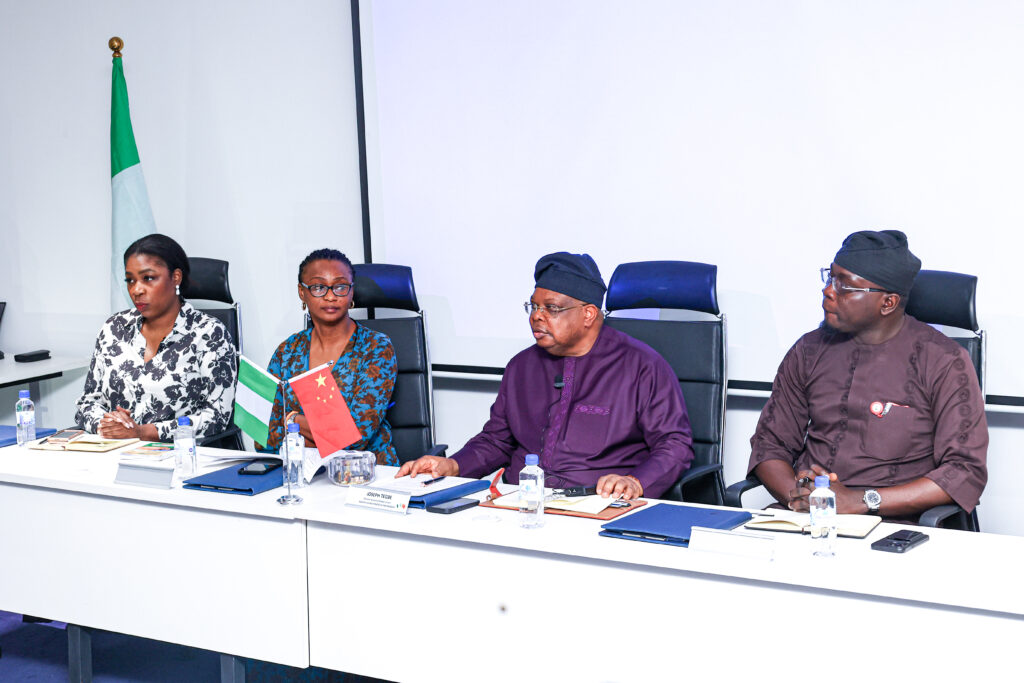
The Director-General of the Nigeria-China Strategic Partnership, Joseph Tegbe recently hosted a delegation from China-Africa Pioneer Company Limited as well as key stakeholders from Nigeria’s public and private sectors such as the Nigerian Investment Promotion Council, Office of the Special Assistant to the President on Agriculture, Overseas Business Development Services Ltd and CPL Ltd, in a forum aimed at advancing Nigeria-China Collaboration. The event, which was tagged as the Nigeria-China Strategic Cooperation Forum, held on December 3rd, 2024, at the World Trade Center in Abuja. The forum aims to foster strategic partnerships between Nigeria and China, exploring opportunities for collaboration in seven key areas: Oil Security, Agriculture, UAV and Drone Assembly, Alternative Energy, Steel Exploration, Healthcare, and Establishment of China-Africa Cooperation Centers. These areas of focus are crucial for driving economic growth, improving living standards, and promoting sustainable development in Nigeria. The event was opened with a welcome address by the Director-General of the Nigeria-China Strategic Partnership and also featured a keynote address by a representative from China-Africa Pioneer Company Limited, and presentations by Nigerian stakeholders on strategic partnership opportunities and projects. A networking session provided a platform for one-on-one meetings and discussions. The Nigeria-China Strategic Cooperation Forum is a significant milestone in strengthening bilateral relations between Nigeria and China. The forum is expected to yield meaningful collaborations and investments in key sectors, driving economic growth and development in Nigeria in line with the Renewed Hope Agenda of President Bola Ahmed Tinubu.



